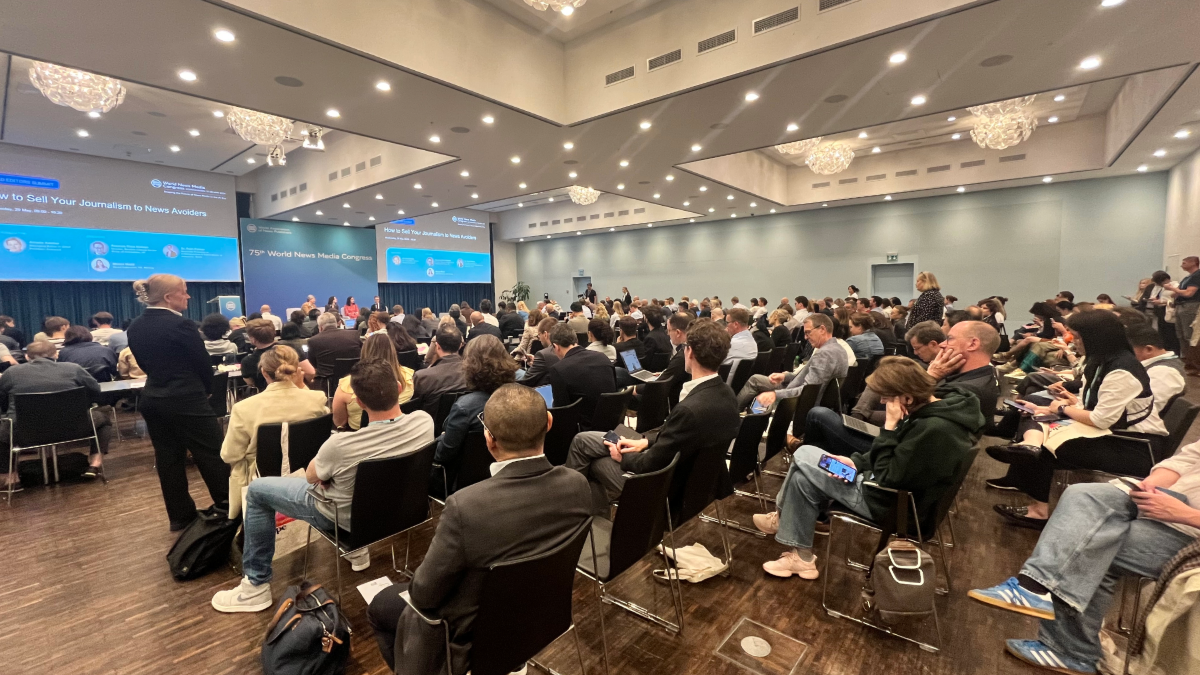World Association of Newspapers 2024 Meeting Discusses AI Deals: To Sign or To Sue?
Anya Schiffrin / May 31, 2024
WAN-IFRA hosted its 75th annual congress in Copenhagen, May 27-29, 2024.
At the 75th WAN-IFRA World News Media Congress last week in Copenhagen, the policy discussion centered around a question posed by Courtney Radsch, director of the center for journalism and liberty at the Open Markets Institute (and a board member at Tech Policy Press), about how newsrooms should handle the threat to their traffic posted by the new Generative AI search engines engines: “to sign or to sue?”
Founded in 1948, every year WAN-IFRA – the World Association of Newspapers and News Publishers – convenes dozens of national newspaper associations, news agencies, regional press organizations, and executives from various newspapers in more than 100 countries at a global congress to discuss issues facing the news industry. Some 1,000 people attended the congress, and in the discussions I attended there was agreement that collective action by publishers, as well as government regulation, is necessary in order for publishers to get a fair price for their content from the tech giants. Executives from multiple regions raised their experiences with news media bargaining codes, describing lessons learned from painful negotiations with Google and Meta over platform remuneration in Australia, Canada, South Africa, Brazil and other countries. The consensus was that Big Tech throws its weight around, so sticking together and having governments involved helps level the playing field.
But now, the use of news to power generative AI systems, such as Google’s Overview AI, means these frameworks need to be updated. Intellectual property law will have to come to terms with large language models,which will mean updating definitions of fair use. Countries that already have collective bargaining and remuneration frameworks for news organizations, such as Canada’s Online News Act and Australia’s News Media Bargaining Code, will need to expand them to include licensing negotiations with AI companies.
Chris Janz, who was at the table during the New Zealand and Australian negotiations with Google and Meta, led a session at the WAN-IFRA Media Policy Forum discussing AI licensing. The consensus among participants was that the threat of government regulation is key in bringing the platforms to the table.
“We have been monitoring the global discourse around fair compensation of news content for the better part of a decade now,” said Elena Perotti, Executive Director for Media Policy at WAN-IFRA, “and what we could observe was that consistently better deals were reached where authorities were engaged, and the news media community managed to stick together.”
One session attendee added that “the (platforms) drag their feet till the 11th hour, but that’s when you get the best deals.”
However, the reality is that many publishers are desperate and often take what they can get. Google has been able to divide and conquer by offering small amounts of money to smaller publishers who then turn against the large ones or become so dependent that they are afraid regulation will upset their arrangements. Hallway discussions were filled with tales of miserable offers from Google and examples over the past few years where publisher ranks were split when Google bought off a major publisher in the market (often through Showcase), thereby weakening the entire collective.
“Google must be laughing. It’s so cheap to buy off one or two publishers in each market,” commented another participant in the room.
To some veterans, today’s discussions about AI are reminiscent of the debates over paywalls in the early days of internet search. At the time, News Corp CEO Rupert Murdoch was one of the lone holdouts, refusing to give away content for free.
While significant deals with AI firms have not yet been signed in the Global South, deals are being made with OpenAI and others. A handful of prestigious publishers in Europe and the US are signing agreements. Lawsuits from publishers are few and far between, with the most-high profile lawsuits coming from the New York Times and the suit brought by Intercept, Raw Story and other progressive publishers. Even IAC, whose chair Barry Diller swore in 2023 that he would lead a class action lawsuit, has now signed a licensing deal with OpenAI, The Washington Post reported on May 27.
Last week, Jennifer Lessin at The Atlantic warned that publishers are making a big mistake, and Hamilton Nolan compared selling off licensing rights at this early stage to “feeling pleased with yourself that you made five bucks selling your house keys to some burglars.”
Economists at the WAN-IFRA meeting explained why there is no first-mover advantage to signing deals now. The technology is still unknown and the quality of the material produced by LLMs is often extremely poor and inaccurate.
“The only reason to take the money now is if you think these LLMs won’t be around later,” said Emily Bell, director of the Tow Center for Digital Journalism at Columbia University which has been tracking deals over the past months. “If you think these companies will succeed then wait, or if you take the money, then reserve the right to revise the agreements later.”
In a series of discussions at the congress, veterans of the bargaining code negotiations talked about how to get platforms to pay out to publishers. Many said litigation is the answer but worried about how to pay for it. Several in the audience noted that Google has far more money for lawyers than the publishers.
“Publishers should not dive instantly in early and make poor agreements. The competition among the LLMs is just beginning. Legal actions against burglary are totally understandable if there is no offer or the negotiation results in negligible figures,” said Marcelo Rech, executive president of Brazil’s National Newspapers Association.
Mike Cragg, an economist who specializes in litigation and works for the tech consulting practice of Keystone, explained that in litigation the harm that has been caused needs to be valued. In the case of LLMs, the potential harm is in the future. So the question is, what actions being taken now are causing harm in the future? In terms of valuation for deals with AI firms, it is also vital to know how the content will be used, as this will affect its value.
“Data used for training a status quo LLM base model, fine tuning such a model, training for a specific application using a retrieval augmented generation (RAG) model for real time or specialized application will all have different values based upon the application,” Cragg explained.
There are, of course, many ways to value news. Companies like Tollbit or the UK-based Human Native can help publishers collect a fee each time their content is used by a web-based agent. Some publishers are looking at their advertising CPMs – the cost of 1,000 impressions – as an indicator of value.
One of my collaborators, Dr. Haaris Mateen, assistant professor at University of Houston, said that dynamic pricing could eventually be commonplace but needs a market that is “thicker” in terms of buyers and sellers, so that prices would change depending on when and in what volume the content is demanded.
“However, the risk is that content that has a higher cost of production – such as investigative journalism – may not have the kind of demand that allows a high enough price. Therefore, it is important to think of valuing content together, whether within a newspaper, or across news publishers such as with a portfolio of local news outlets.” He added, "We also need better technological solutions to enable such a market."
In February, Indonesia issued new regulations on publisher's rights, with details expected later this year. South Africa’s competition authority has completed public hearings and is expected to issue a report towards the end of 2024.
“The media industry has in recent years been dealt a huge blow by Big Tech, and that needs to be fixed, urgently so,” said Reggy Moalusi, Executive Director of South Africa’s National Editors’ Forum (SANEF) which has been deeply involved in negotiations with Google in South Africa.
In Belgium and Switzerland publishers have been trying to negotiate collectively, and in Denmark the publishers have also agreed to a collective bargaining framework. Courtney Radsch is tracking fair compensation legislation all over the world.
Resistance from Google and Meta has been strong. The firms have followed the usual US corporate playbook: they’ve lobbied hard, commissioned “research,” supported journalism conferences and fellowships, circulated misleading talking points about the platform remuneration laws, and spooked regulators by threatening to exit entire markets. Publishers are afraid, especially as new research shows the fall in referral traffic from Meta after it dropped Canadian news links. Meta left Canada because it didn’t want to pay for news content, but is now using it in AI-generated products, without paying publishers.
Authors
